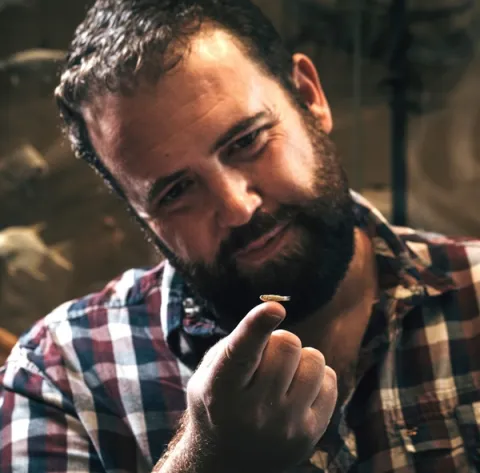Project overview
Lizard Island John and Laurine Proud Postdoctoral Fellowship
Our project focuses on a group of tiny, camouflaged reef-dwelling fishes known as cryptobenthic fishes or, more simply, cryptos. These fishes are highly abundant on many of the world's coral reefs, often accounting for half of the fish present on a reef. However, because many crypto species spend their lives hidden from view, they are very difficult to study and have often been overlooked. Recently, we used information on the abundance and lifespans of cryptos from coral reefs around the globe to calculate their potential importance in coral reef food webs. Remarkably, we found that these tiniest of reef fishes may provide more than two-thirds of all the fish tissue consumed by reef predators. In essence, cryptos may form a critical foundation supporting communities of large reef fishes (or anyone who wants to catch or eat those big fish). While this role is clearly important, we currently have a limited understanding of which cryptos live on reefs around the world and an incredibly poor knowledge of what these little fishes eat to support their growth (and, in turn, that of the predators that eat them). In our project, we aim to discover what species of cryptobenthic fishes live on the reefs around Lizard Island and to explore how they differ in their habitat use and diets.
Our project focuses on a group of tiny, camouflaged reef-dwelling fishes known as cryptobenthic fishes or, more simply, cryptos. These fishes are highly abundant on many of the world's coral reefs, often accounting for half of the fish present on a reef. However, because many crypto species spend their lives hidden from view, they are very difficult to study and have often been overlooked. Recently, we used information on the abundance and lifespans of cryptos from coral reefs around the globe to calculate their potential importance in coral reef food webs. Remarkably, we found that these tiniest of reef fishes may provide more than two-thirds of all the fish tissue consumed by reef predators. In essence, cryptos may form a critical foundation supporting communities of large reef fishes (or anyone who wants to catch or eat those big fish). While this role is clearly important, we currently have a limited understanding of which cryptos live on reefs around the world and an incredibly poor knowledge of what these little fishes eat to support their growth (and, in turn, that of the predators that eat them). In our project, we aim to discover what species of cryptobenthic fishes live on the reefs around Lizard Island and to explore how they differ in their habitat use and diets.
Staff
Lead researchers
Collaborating research institutes, centres and groups
Research outputs
Christopher H. R. Goatley, Simon J. Brandl, Stephen Wroe & David R. Bellwood,
2021, Coral Reefs, 40, 75-82
Type: article
Simon J. Brandl, Luke Tornabene, Christopher H. R. Goatley, Jordan M. Casey, Renato A. Morais, Isabelle M. Côté, Carole C. Baldwin, Valeriano Parravicini, Nina M. D. Schiettekatte & David R. Bellwood,
2019, Science, 364(6446), 1189-1192
Type: article
